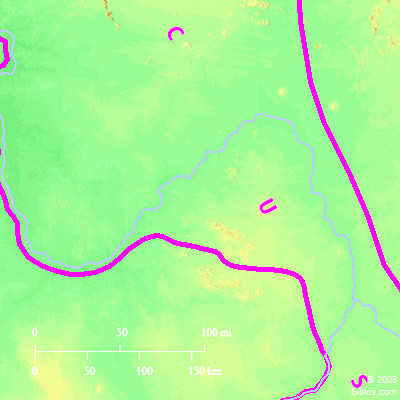Atlas  Cush and surrounding area Maps Created using Biblemapper 3.0 Additional data from OpenBible.info You are free to use up to 50 Biblos coprighted maps (small or large) for your website or presentation. Please credit Biblos.com. Occurrences Genesis 2:13 The name of the second river is Gihon: the same river that flows through the whole land of Cush.2 Kings 19:9 When he heard it said of Tirhakah king of Ethiopia, "Behold, he has come out to fight against you, he sent messengers again to Hezekiah, saying, Isaiah 11:11 It will happen in that day that the Lord will set his hand again the second time to recover the remnant that is left of his people from Assyria, from Egypt, from Pathros, from Cush, from Elam, from Shinar, from Hamath, and from the islands of the sea. Isaiah 18:1 Ah, the land of the rustling of wings, which is beyond the rivers of Ethiopia; Isaiah 20:3 Yahweh said, "As my servant Isaiah has walked naked and barefoot three years for a sign and a wonder concerning Egypt and concerning Ethiopia, Isaiah 20:5 They will be dismayed and confounded, because of Ethiopia their expectation, and of Egypt their glory. Isaiah 37:9 He heard news concerning Tirhakah king of Ethiopia, "He has come out to fight against you." When he heard it, he sent messengers to Hezekiah, saying, Isaiah 43:3 For I am Yahweh your God, the Holy One of Israel, your Savior. I have given Egypt as your ransom, Ethiopia and Seba in your place. Isaiah 45:14 Thus says Yahweh: "The labor of Egypt, and the merchandise of Ethiopia, and the Sabeans, men of stature, shall come over to you, and they shall be yours. They will go after you. They shall come over in chains; and they will bow down to you. They will make supplication to you:'Surely God is in you; and there is none else. There is no other god. Jeremiah 46:9 Go up, you horses; and rage, you chariots; and let the mighty men go forth: Cush and Put, who handle the shield; and the Ludim, who handle and bend the bow. Ezekiel 29:10 therefore, behold, I am against you, and against your rivers, and I will make the land of Egypt an utter waste and desolation, from the tower of Seveneh even to the border of Ethiopia. Ezekiel 30:4 A sword shall come on Egypt, and anguish shall be in Ethiopia, when the slain shall fall in Egypt; and they shall take away her multitude, and her foundations shall be broken down. Ezekiel 30:5 Ethiopia, and Put, and Lud, and all the mixed people, and Cub, and the children of the land that is in league, shall fall with them by the sword. Ezekiel 30:9 In that day shall messengers go forth from before me in ships to make the careless Ethiopians afraid; and there shall be anguish on them, as in the day of Egypt; for, behold, it comes. Ezekiel 38:5 Persia, Cush, and Put with them, all of them with shield and helmet; Nahum 3:9 Cush and Egypt were her boundless strength. Put and Libya were her helpers. Zephaniah 3:10 From beyond the rivers of Cush, my worshipers, even the daughter of my dispersed people, will bring my offering. Encyclopedia CUSH (1)kush (kush): CUSH, the name of a district, at the beginning of biblical history, near the head of the Persian Gulf, but afterward, in the migration of the Cushite family, the name was applied to s.e. and to s. Arabia and gradually to western Arabia not long before the time of Solomon. After that time the Cushites had spread themselves not only in Arabia but as it appears from the monuments, had crossed the Red Sea at the straits of Bab el Mandeb and settled in Abyssinia in that part called, afterward, by the Greek geographers, Ethiopia. Wherever Ethiopia occurs in our English translation of the Scriptures, it is Cush in the Hebrew. The Cushites were a dark race and were so described on the monuments, but were distinct from the negroes. In Gen. 2:13, Cush is at the head of the Persian Gulf. In Num. 12:1 the "ethiopian" was an Arabian Cushite, in 2 Ks. 19:9 it refers to the land now known as Ethiopia but in the Hebrew it is always "Cush." Strong's Hebrew H3568a: Kusha son of Ham, also his desc., also a land in the S. Nile Valley |



